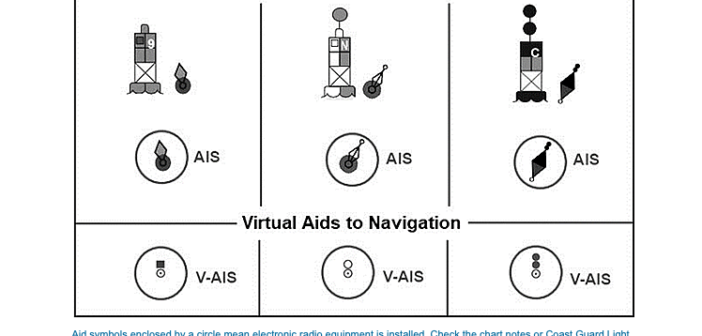Here’s some great advice from Skipper Tips about how to use AIS symbols on charts to help you cruise safely:
Imagine cruising into a new channel, scanning the chart, and finding some buoys have a magenta circle around the buoy symbol. What does this mean, and how can you use these navigation markers to boost cruising safety?
Most cruisers already know the value of the Automated Identification System, or AIS, and how it helps prevent collisions at sea. Some buoys and beacons are also equipped with AIS transmitters which give the position, description, and purpose of the aid. Three types of aids to navigation (ATON) use AIS.
Physical AIS Aids
NOAA charts will show AIS-equipped aids with a magenta circle surrounding the buoy or beacon, and the abbreviation ‘AIS’. ENC might show just the circle without the abbreviation. Click your mouse over the buoy symbol to find all characteristics of the specific ATON.
Virtual AIS Aids
These invisible navigation aids will appear only on an AIS-enabled Radar, Electronic Chart Display and Information System (ECDIS), or Electronic Charting System (ECS). Note the unique symbols enclosed by the circle on the lower row of the illustration above. There is no physical buoy, beacon, or light at that location. The information received is the same as that given for the physical aid.
Virtual AIS aids might be used where buoys are moved seasonally, such as in sea ice, or where a marker needs to mark a new isolated danger or wreck, and there is not enough time for a ship to respond to install an actual physical aid to mark the danger. Virtual buoys and beacons are labeled ‘V-AIS’ on an electronic display screen.
Synthetic AIS Aids
Some physical buoys or beacons do not have AIS equipment installed on the marker. AIS information, such as position, characteristic, and purpose, are sent from a shoreside station. Synthetic aids do not show a magenta circle or a specific AIS-related abbreviation on the chart. Only the buoy or beacon symbol and characteristics are shown.
ATON ‘Off Position’ Warning
If the transmitter is on a physical AIS ATON, the signal always corresponds to the actual position. You will also receive a number code, which tells you if the buoy is on or off station.
0 = on position
1 = off position
An additional text message will be broadcast which states: ATON OFFPOSITION.
Read more: http://skippertips.com




